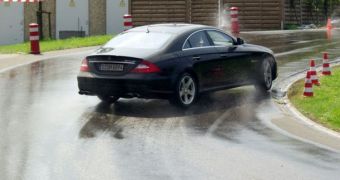Scientists who recently completed a new genetic research on the issue say that at least 30 percent of Americans may be innate bad drivers. The experts argue that those who have a variant of a certain gene were proven in the investigation to not be able to keep their cars on the road as efficiently as other people could. The gene, which may equal bad driving, is also passed down to children, so one might argue that bad driving is genetic, LiveScience reports.
“These people make more errors from the get-go, and they forget more of what they learned after time away,” University of California in Irvine Associate Professor of Neurology Steven Cramer says. He has also been the lead researcher on the new study, which was published in a recent issue of the respected scientific journal Cerebral Cortex. “I'd be curious to know the genetics of people who get into car crashes. I wonder if the accident rate is higher for drivers with the variant,” the expert adds. Funding for the research came from the US National Health Institutes (NIH).
In the experiments, 22 individuals without the troublesome gene, and seven that had it, were asked to complete a few laps in a car simulator. The course required them to learn some subtle nuances that the track had, and also to remember how to navigate some dangerous curves. After a few laps were completed, the participants were asked to go home, and then they repeated the “drive test” some four days later. It was discovered that the participants with the “faulty gene” fared 20 percent worse than those who did not have the gene.
The gene that is believed to be responsible for such effects is the one that codes for the brain-derived neurotrophic factor (BDNF), a protein that plays a fundamental role in learning, and helps concentration by boosting communication between neurons. When a person is, for example, engaged in a specific task, then the gene produces more BDNF in that brain area correlated with that action, so as to maintain peak performances. Previous researches have also shown that a smaller brain area in people with the gene is activated when an action requires concentration, than that in people without the gene.
“It's as if nature is trying to determine the best approach. If you want to learn a new skill or have had a stroke and need to regenerate brain cells, there's evidence that having the variant is not good. But if you've got a disease that affects cognitive function, there's evidence it can act in your favor. The variant brings a different balance between flexibility and stability,” Cramer concludes.

 14 DAY TRIAL //
14 DAY TRIAL //